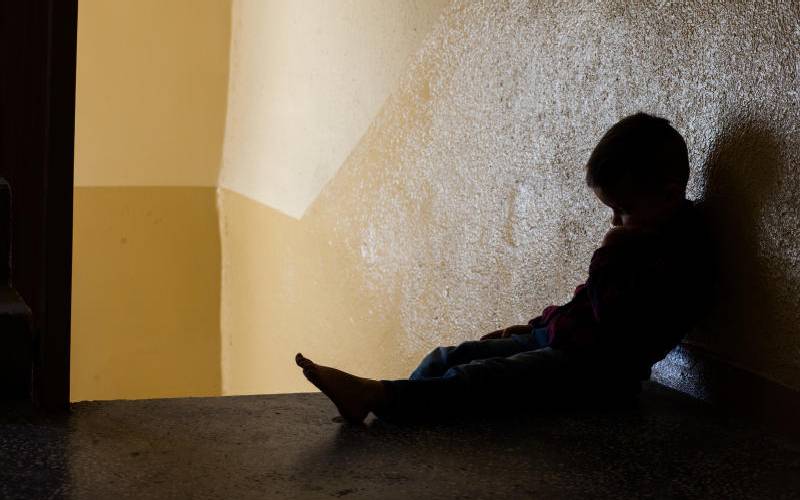
At least 30 children get abused in the country each week. This is according to latest statistics by the Childline centre.
The figures have peaked during the Covid-19 pandemic period, and on the week ending May, 52 children were reportedly abused between May 25 and May 31.
This means that averagely, in that week alone, seven or more children were abused every day, with the officials fearing there could be many more cases going unreported. The cases have almost tripled since the first week of March when they had 20 cases of abuse being reported.
Physical abuse, defilement and child neglect remain the top forms of child abuse the centre records.
Helpline service
Childline Kenya works in partnership with the Government to stop child abuse and provide a safe environment for all children. They are a nationwide helpline service dedicated to children that runs 24 hours toll free. It is accessible by dialing 116.
“The figures could be much more but there are many children who do not report, and others report to their parents and guardians but nothing is done. Sadly, most of the abuse cases are happening at home,” says Martha Sunda, executive director of Childline Kenya.
Child marriages, emotional abuse and abandonment are also listed as some of the rising forms of child abuse. Sunda explains that they get a lot of calls about children being verbally abused, or feeling ignored even though their parents are physically present, and this causes them emotional torture.
Most abuse cases are reported in Nairobi, but Sunda says that it could be because of the easy connectivity that allows children and people who witness child abuse to report.
Her revelation on the state of child abuse comes after a horror video of young teenagers engaging in a sexual orgy appeared on social media, sparking outrage from child rights activists calling for the arrest of the person who circulated the video. In between, there have been tales online and off the internet, telling of the brutality children are going through.
“Someone needs to stop this madness. Children are getting ruined as parents put their focus on other things,” said Dorcas Oloo, a primary school teacher who says even though schools are not in session, they still get calls from panicked children who confide in them about the abuse they are going through, with some getting abused by their own parents.
The statistics from the Childline centre shows that when calls are made by children, majority of them raise issues with parents mistreating them or their peers.
Maimuna Omar, a volunteer social worker in Kibra says since Covid-19 curfew and restricted movement was declared, there are many children who run away from home due to abuse they are facing.
“I had a young boy, about eight years old, knocking on my door. He was shaking. His father would mercilessly beat him for minor mistakes. Parents are stressed and piling it on their children,” says Omar.
Stay informed. Subscribe to our newsletter
Omar says that while in the past, most of the abuse cases she would encounter were based in the slum, she now comes across many cases of children in high end homes, who are living with the pain of daily abuse from their house helps, relatives and parents.
On the impact of coronavirus, statistics from Childline say more parents are calling in at the centre about child maintenance. They have got more than 1,000 parents calling to complain about child maintenance, with the last two weeks registering the most calls. The week when the first case of Covid-19 was reported in the country also saw a spike in the number of cases around child maintenance. There have also been a lot of cases where there is conflict on child custody.
Restricted movement
Titus Njogu, who is trained in custody law says the restricted movement has put a lot of pressure on parents with shared custody, and the children caught in between the arrangement getting emotionally tortured.
“Parents argue about custody while children are listening. In their young minds, the children start thinking they are the reason their parents are unhappy. We have a lot of depressed children out here in situations they have no control of,” says Njogu.
The increased cases of child abuse were also highlighted by the Directorate of Criminal Investigations (DCI) who warned of an increase in reported cases of offences against children during online learning.
“In four such reported cases, the predators sent children messages in their inboxes complimenting their looks then after gaining their trust, went ahead to ask them for their nude images among other despicable acts,” read a report from DCI.
The perpetrators are reported to be taking advantage of digital learning programmes to lure children and later abuse them.
 The Standard Group Plc is a
multi-media organization with investments in media platforms spanning newspaper
print operations, television, radio broadcasting, digital and online services. The
Standard Group is recognized as a leading multi-media house in Kenya with a key
influence in matters of national and international interest.
The Standard Group Plc is a
multi-media organization with investments in media platforms spanning newspaper
print operations, television, radio broadcasting, digital and online services. The
Standard Group is recognized as a leading multi-media house in Kenya with a key
influence in matters of national and international interest.
 The Standard Group Plc is a
multi-media organization with investments in media platforms spanning newspaper
print operations, television, radio broadcasting, digital and online services. The
Standard Group is recognized as a leading multi-media house in Kenya with a key
influence in matters of national and international interest.
The Standard Group Plc is a
multi-media organization with investments in media platforms spanning newspaper
print operations, television, radio broadcasting, digital and online services. The
Standard Group is recognized as a leading multi-media house in Kenya with a key
influence in matters of national and international interest.






